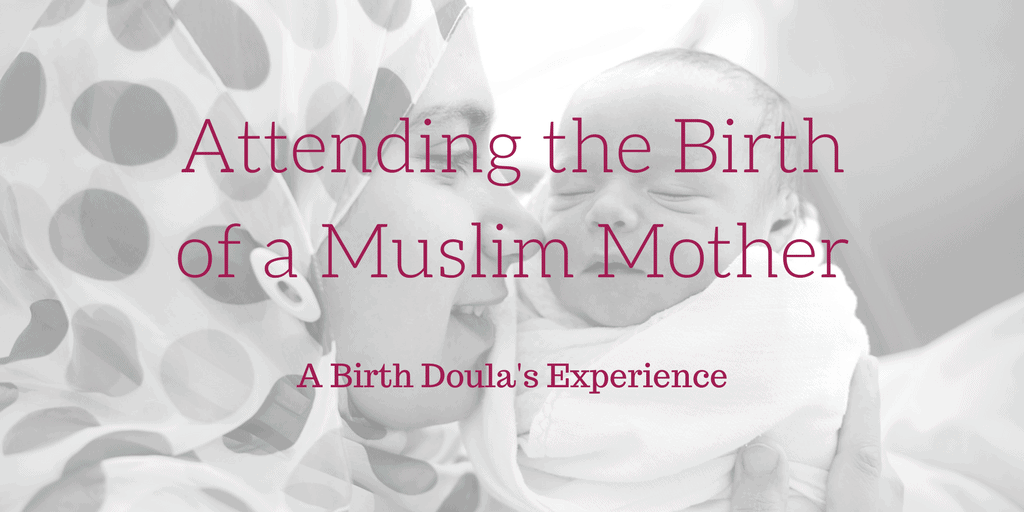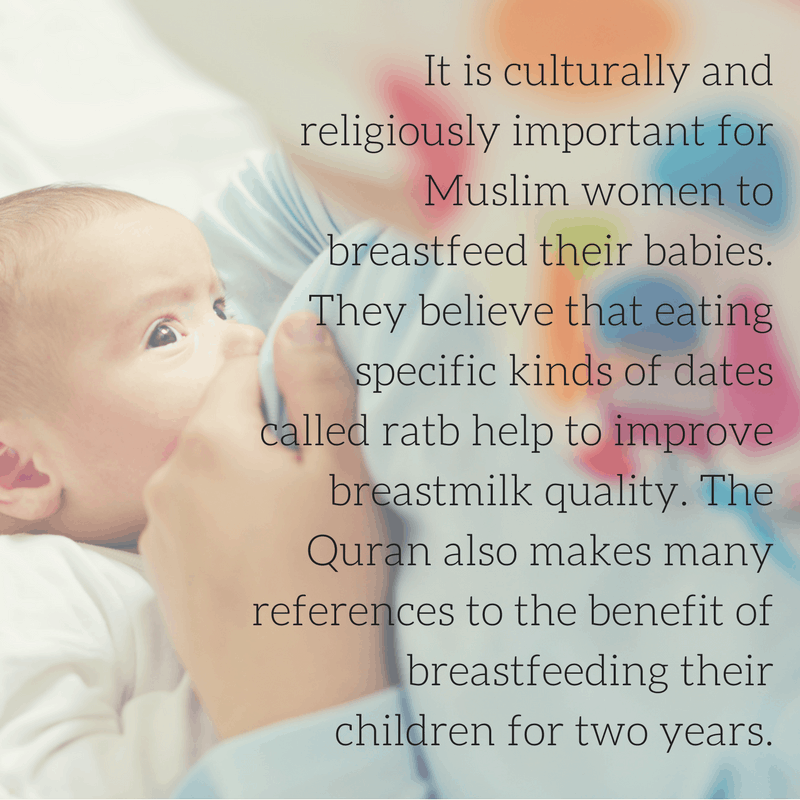Attending the Birth of a Muslim Mother: A Birth Doula’s Experience

I have been called to attend two births of Muslim mothers in my time as a doula. I have found their culture to be very warm and welcoming, and I loved the experience I gained from attending Muslim families. This particular Muslim birth I attended was a very special experience.
The whole family came and waited and prayed in the waiting area while the mom labored. Everyone was very happy and friendly, and at one point they started a roster with guesses of birth weight and time of birth that was almost two pages long! Most Muslim births are all-female with only the birthing woman’s mother, mother in law, sisters, and other female family members present.
While this sweet mother did not choose to have an all-female staff, most observing Muslim women prefer to only birth in a location where they can guarantee no men will be present with the exception of the father of the baby. This can also exclude male doctors and nurses, so the birthing location is methodically thought out prior to baby’s arrival. Many Muslim women also prefer to stay very modest and covered throughout the birth experience, using sheets to cover their legs while pushing and minimal exposure of their pregnant belly.
While speaking to this family before the birth, they told me that the level of dedication to their religion dictates how the mother chooses to dress during birth. This mother was planning on letting her instincts and body lead and guide her during her birth and she wasn’t going to worry about remaining any more modest than she felt would be comfortable for her.
During birth it is normal for prayers to be spoken aloud for the mother to listen to as she labors. The prayers are quiet and meditative, and although I couldn’t understand what was being said, it was so beautiful and calming to listen to. My client’s mother in law was the one praying during this birth and she was so sweet, hugging me in celebration of new life.
After this baby was born, she was brought up to her mother’s chest and my client’s mother-in-law began to ‘read on’ the baby. I felt honored to witness this private rite of passage; sometimes this can also be referred to as an Adhan. Prayers and verses from the Quran are whispered in to the baby’s right ear and then again into the baby’s left ear so that it is the first words she hears. Many of these versus are fundamental and serve as a pivot point around which the life of a Muslim rotates, so it is very symbolically significant to be done immediately after birth.
It is culturally and religiously important for Muslim women to breastfeed their babies. They believe that eating specific kinds of dates called ratb help to improve breastmilk quality. The Quran also makes many references to the benefit of breastfeeding their children for two years. After birth, the women are given Cinnamon Tea to help the uterus shrink back to size, ease cramping and discomfort, and warm the mother. It is often used during periods for similar reasons. Cinnamon Tea is made with cinnamon sticks boiled in water, and then walnuts, sugar, and butter are put in it before drinking. I was so excited when I was offered some during my postpartum visit with this mom and I still think about the amazing taste and heat of that tea. It really cleared my sinuses!

Each religion and culture has their own customs surrounding pregnancy and birth. It is not typical for Muslim women to have a baby shower, but women still can if they choose to, especially as Western culture finds its way into many aspects of day-to-day life. Often, after a Muslim child is born it is common for an aqiqah (pronounced ah-kee-kah) to be held a week or so after the baby is born to celebrate with close family and friends. Other than this celebration, the family stays in their home for up to 40 days while family and friends provide meals to them during that sacred postpartum time.
I still have so much to learn about this amazing culture and its people. Going into these births, I was very open about wanting to know how to best serve these families. I asked them to tell me as much as I needed to know so that I could support them with love and respect. I would advise anyone in a similar doula/client situation to do the same.
These families were so happy and willing to share their personal lives and culture with me, don’t be afraid to ask! If you have experience working with other cultures or specific religions, make sure that people know it! The second Muslim family contacted me for their birth because they heard that I had previously worked with other Muslims, and it was comforting to them. If you have specific experience, list that on your website so it’s welcoming for people of other cultures.
Many times, if you have multi-cultural experience it will lead to a more diverse clientele, not just more of the same culture you are advertising to. You are drawing in and welcoming all kinds of people by showing that you have a willing heart to serve those who have a different cultural background than you do.
 Bonnie Baker is a birth doula, Hypnobabies instructor, placenta encapsulation specialist, bengkung belly binder, and fertility educator. She serves Salt Lake County and Davis/Weber County. Learn more about Bonnie at www.BellisimoBirth.com
Bonnie Baker is a birth doula, Hypnobabies instructor, placenta encapsulation specialist, bengkung belly binder, and fertility educator. She serves Salt Lake County and Davis/Weber County. Learn more about Bonnie at www.BellisimoBirth.com

Very awesome post.
Thank you for sharing this experience. I can’t wait to become a doula—this story warms my heart—I love how each culture is unique.
Beautiful!